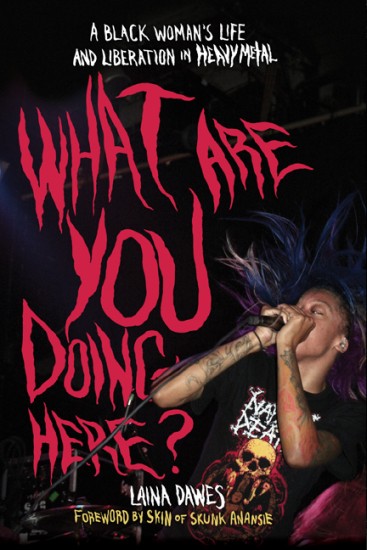
When Laina Dawes was eight years-old, she sat in front of her television watching the made-for-television movie “Kiss Meets The Phantom of the Park.” Soon after, her parents gave her Kiss’ Double Platinum record, and later followed an obsession with bands like Judas Priest and Black Sabbath. Laina Dawes is a bona fide metal head. But her fandom is complicated, though it probably shouldn’t be, by the fact that Laina is a black woman.
During her time in the heavy metal scene, she has experienced a lot of racism and sexism, as well as judgment and hostility from various black communities. Laina Dawes is the author of “What Are You Doing Here?: A Black Woman’s Life and Liberation in Heavy Metal" (Bazillion Points, 2013).
Dawes talks with host Frank Stasio about the complicated relationship she has with heavy metal. She says that although heavy metal has in the past been viewed as a white male scene, the music can be powerful for anyone who feels like they need an outlet for anger.
“Heavy metal has always had this stereotype of being a working-class blue collar music for predominantly men who are frustrated by their day job, and want to listen to music to let out their aggressions…” Dawes says. “I think that translates to how people are still drawn to the music…It’s for the positive energy and the positive aggression that you have the ability to let out…and we’re not able to do that in other aspects of their lives.”
Dawes grew up in rural Kingston, Canada, as one of the only black people in her community. Listening to heavy metal was one of only a few things that helped her deal with her frustration and feelings of isolation.
Dawes tells host Frank Stasio that “the music was what got me through…I never did fit in, and I always felt like an outsider, but I knew that I desperately needed something to make me feel better, and to make me feel more empowered then I did in my everyday life.”
Although heavy metal can be very empowering to its listeners, the scene surrounding it can be very racist and sexist. Dawes spoke to many black women involved in those scenes in their respective communities who survived violence inflicted on them on the basis of their race.
“One of the women I interviewed for the book was knocked unconscious” states Dawes.
“Another girl in Atlanta was chased around the venue by a bunch of skin heads, because they had warned her that she had to leave because they didn’t want her there…And then they stayed so they chased her,” she recalls. “You get these extreme stories of people violently reacting to your presence.”
And not only has there been push back from white people in the heavy metal scene, but black communities have taken issue with black people’s participation in heavy metal. Dawes explains that listening to heavy metal as a black person is often seen as something that makes you “less black.”
“One of the reasons I’ve faced resistance from various black communities is the [link to culture]. Blues music is not just music, it’s seen as a narrative of the lives of African Americans who came before us…it has a connection to African-American listeners,” says Dawes. “But on the other hand in terms of listening and participating as a fan or musician it should be wide open.”
But there are still black women breaking down barriers and performing heavy metal. Dawes says that her favorite part of this project has been meeting women who challenge the norm with their passion for the genre.
“The best part of this journey is meeting extremely strong women who want to play the music that they’re passionate about and also realize that there are a lot of roadblocks in their way,” Laina reflects. “And for them it’s not about the money. It’s about them being passionate about their art.”
I, for one, am going to read it because I have always battled against the accusations of heavy metal being sexist and racist and I've always believed that knowledge is the best weapon.
No comments:
Post a Comment